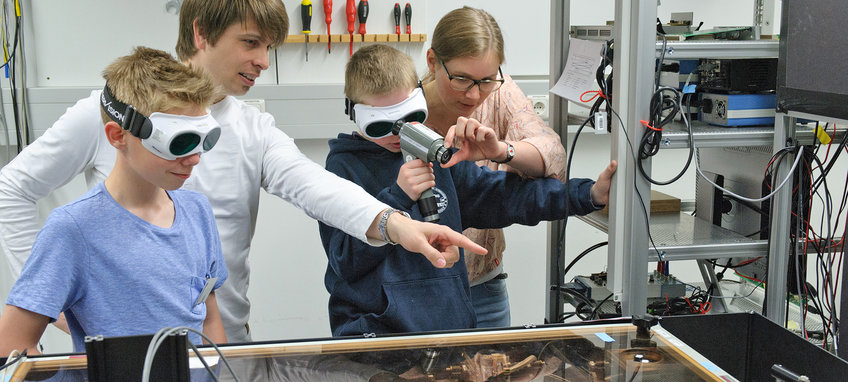
Schools
School attendance is mandatory for all children who live in Germany and are between 6 and 15 years of age. In Lower Saxony, children start primary school at the age of 5 or 6. After 4 years, they continue to a secondary school. There are different types of secondary schools in Germany, offering different levels of education.
The school year usually starts in August or early September and ends in June or July. Actual dates vary from year to year and from state to state. Summer break is about six weeks long, with further holiday periods of varying length in autumn, around Christmas, and spring. In total, German children get about three months off from school every year (here you can find a full list of German school holidays). Please note that only some schools are all-day schools (Ganztagesschule). A list of those schools in Göttingen can be found here.
Grades are given on a scale from 1 to 6, with 1 being the top grade while 5 and 6 are both fail grades.
Different types of schools offer different levels of education
There are the following types of school in the state of Lower Saxony:
-
Primary school ( Grundschule, 1st to 4th grade): For the first four grades, all children attend the same school. Focus is on basic skills such as reading, writing, and basic mathematics.
-
Standard secondary school ( Hauptschule, 5th to 9th or 10th grade): Passing the final grade of this school type qualifies your kid for the minimum general school-leaving certificate. Since the German job market is very competitive and only about 25 % of today's children attend Hauptschule, this certificate may only lead to some basic jobs, many of them with very low pay.
-
Intermediate secondary school ( Realschule, 5th to 10th grade): Passing 10th grade in this school type leads to the intermediate certificate of education. In practice, this is your minimum requirement for most banking and office jobs, as well as for most jobs with more than a basic salary. An intermediate school certificate does not qualify you to study at a university.
As of 2011, Standard and Intermediate secondary schools can be combined in the Oberschule.
Note: If your child takes up an apprenticeship or other training position after graduating, they will usually attend a Berufsbildende Schule (vocational school) for additional courses relevant to their field.
-
Senior high school (Gymnasium, 5th to 13th grade): In many urban areas, this has become the school of choice for a majority of adolescents. The final certificate, Abitur, qualifies students for attending a university. In practice, though, Abitur has become a minimum requirement for many other high-paying jobs that do not formally require a university degree. This certificate gives your child by far the best chances in the competitive German job market. In Lower Saxony, the Abitur is generally awarded after 13th grade.
-
Comprehensive school ( Gesamtschule, from 5th grade and on): Comprehensive schools combine various types of the schools listed above. Göttingen has two comprehensive schools. In many cases, children attend some classes together, and some according to their achievement level. In Göttingen, there is one comprehensive school (IGS) that includes its own branch leading to Abitur, whereas another one (KGS) requires you to transfer to a regular Gymnasium after grade 10.
Public schools are the German standard
Most schools in Lower Saxony are run by the state and free of charge; more than 95 % of all children attend public schools. There are few private schools, and some may be very expensive. They often offer alternative learning methods (e.g. following the Waldorf or Montessori principle). In Göttingen, there are three private schools: The Catholic Bonifatiusschule, a Waldorf school and a Montessori school. In contrast to many other countries, the type of your school certificate is generally more important on the job market than the fact whether your school was a public or private institution. In Germany, attending a private school does not always guarantee a better quality of education. The general language of instruction is German, with language classes ideally taught in the subject language (except Latin and ancient Greek).
Bilingual schools in Göttingen
All of the bilingual schools mentioned below are also all-day schools.
In this Primary school, 70 % of classes given in English and an additional focus is on sports.
Senior high school offering an International School for the two final grades, allowing students to obtain an International Baccalaureate. In the lower grades, English is progressively introduced as teaching language. The website gives in-depth information in English.
High school offering some bilingual classes (Politics, Biology, and Gym) from 6th grade onwards.
High school offering bilingual classes (History, Politics, Biology, Geography, Music, and Gym) from 6th grade onwards and an additional focus on music. The website offers some information in English.